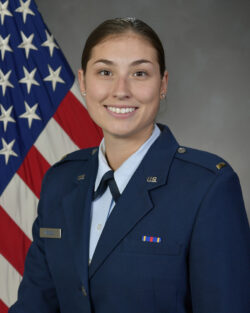While many business students study abroad to learn business on an international stage, experience different cultures and hone language skills, students in military service study abroad for these reasons and more.
Rachel Gatsche, program manager for the Haslam College of Business’s International Programs and Partnerships at the University of Tennessee, Knoxville, understands military student motivations. Gatsche, a veteran of the U.S. Air Force, where she spent six years as a linguist, studied abroad during her college career. She believes understanding the intersections of the global economy and geopolitics is crucial for students in the military or those interested in serving.
“That knowledge positions them to best assist U.S. allies, support international assets and prepare the U.S. for combat readiness across industries,” Gatsche says. “Further, service member students with international experience strengthen their resiliency, cross-cultural competency and critical problem-solving skills, which directly translate to any military career.”
Haslam Military Service Students Find Value in International Experiences
U.S. Air Force Air National Guard Staff Sergeant Christian Weaver, a Haslam senior, undertook two study abroad experiences this summer. During his coursework in both Greece and Italy, he gained insights about improving processes.
“Studying abroad challenged my thinking of just doing it the American way or the way we’ve done  for so long,” Weaver says.
for so long,” Weaver says.
This challenge to traditional thinking is especially notable regarding recycling and renewable resources, where Weaver says Europe far outpaces the U.S. The Air Force and the civilian hospital where he works haven’t made as much sustainability progress, but Weaver believes he can introduce processes and techniques to aid in this area.
“Less waste, more usage, reuse, reduce, recycle — use all renewable resources and save money,” he lists off. “I was thinking in meetings with business leaders abroad, ‘We can bring this back to my hospital, to my unit with the Air Force, save the Air Force money, save people time.’ One of the most valuable things I learned is not to just accept, ‘This is just how it’s done.’”
When Second Lieutenant Bailey Nickles (HCB, ’23), who is currently stationed at Hill Air Force Base in Utah, wanted to study abroad, she pursued a shorter program that fit with her existing ROTC duties, opting for a spring break program in Chile.
Nickles says the program schedule was tightly focused and filled with tours of local businesses, as well as presentations from local business owners. The term culminated with student teams giving 30-minute presentations on how Chilean culture affects a given industry, as well as the differences between that industry in the U.S. and Chile.
 Nickles’ team covered the Chilean mining industry, a critical business in the country, and she learned that certain industries and national governments may not treat their workers and citizens as well as the U.S.
Nickles’ team covered the Chilean mining industry, a critical business in the country, and she learned that certain industries and national governments may not treat their workers and citizens as well as the U.S.
“That was an eye-opener, because the Chilean government owns most of the mines, and they don’t treat all their workers or all the communities the best,” she says.
Beyond learning more about industries in another country, conducting that presentation — the longest Nickles gave in college — delivered another practical benefit for her Air Force career.
“I’ve only been here at Hill two months, and I’ve already given two 20-minutes briefs by myself, so I think it really helped with that,” she says.
Supply chain management senior and ROTC Cadet Cassandra Rozman spent the summer term studying in Greece. In addition to taking in the beautiful scenery, she also learned the importance of adaptability. In Greece, Rozman met a U.S. Embassy representative who had to be adaptable to cultural conditions, which made her realize cultural diversity will be part of her own military career, too.
“[B]eing abroad…showed me I’m going to have to learn how to adapt culturally if I were to be  deployed overseas,” she says.
deployed overseas,” she says.
Rozman will receive her commission and military service plans on November 30. While she is excited to obtain the commission, her study abroad experience is helping her prepare for the life-changing news. “It was definitely slower paced in Greece,” she says. “It helped me slow down too. Being a busy college student, being very consumed with ROTC, it is important to take a step back and enjoy the moment.”
Study Abroad Support from Haslam
Weaver, Rozman and Nickles advise students considering study abroad to research the plethora of available scholarships. They also give high marks to the support they received from the International Programs and Study Abroad (IPSA) staff.
“I didn’t realize how many scholarships they grant,” Rozman says. “I was given so many resources with applying to different scholarships to help fund the whole trip.”
“IPSA walks you through the steps of how to buy the plane ticket, and they have a budget breakdown and [tell you] when all the applications are due,” Nickles says. “They work with you really well.”
“There are so many opportunities with Haslam, with study abroad and UT as a whole,” Weaver says. “They have blessed us heavily by putting whatever we need to be successful in front of us. Especially as a military member, I’ve been accommodated for so much. Every question I have has been met with gratitude and grace.”
How Service Member Students Impact Study Abroad
Gatsche believes service members who study abroad provide other students with a unique insight into the common ground between defense, industry and culture.
“These are hardworking, patriotic students who will be working to make the military and the U.S a better international ally, trade partner and cultural partner,” she says.
Sara Easler, assistant dean for International Programs & Partnerships, considers service members’ participation in study abroad a significant asset.
“Military service students and veterans enhance our study abroad cohorts’ experience tremendously in the kinds of backgrounds and experiences that they bring to our global classrooms,” she says. “Service members often demonstrate independence and maturity and have a strong work ethic and leadership capabilities. These are qualities we hope study abroad reinforces in all of our students.”
About Haslam Abroad
Haslam Abroad develops and supports highly experiential programs and international opportunities that enrich participants’ overall academic experience through exposure to ways of thinking about and doing business in other countries. Through the IPSA Office, Haslam students have an incredible variety of study abroad opportunities all over the world, with programs ranging from short-term and faculty-led programs to longer semester or even academic-year exchanges. Business study abroad programs are primarily taught in English and available to all majors and collaterals. Learn more about Haslam’s international programs, and begin your journey to studying abroad today.
—
CONTACT:
Scott McNutt, business writer/publicist, rmcnutt4@utk.edu

